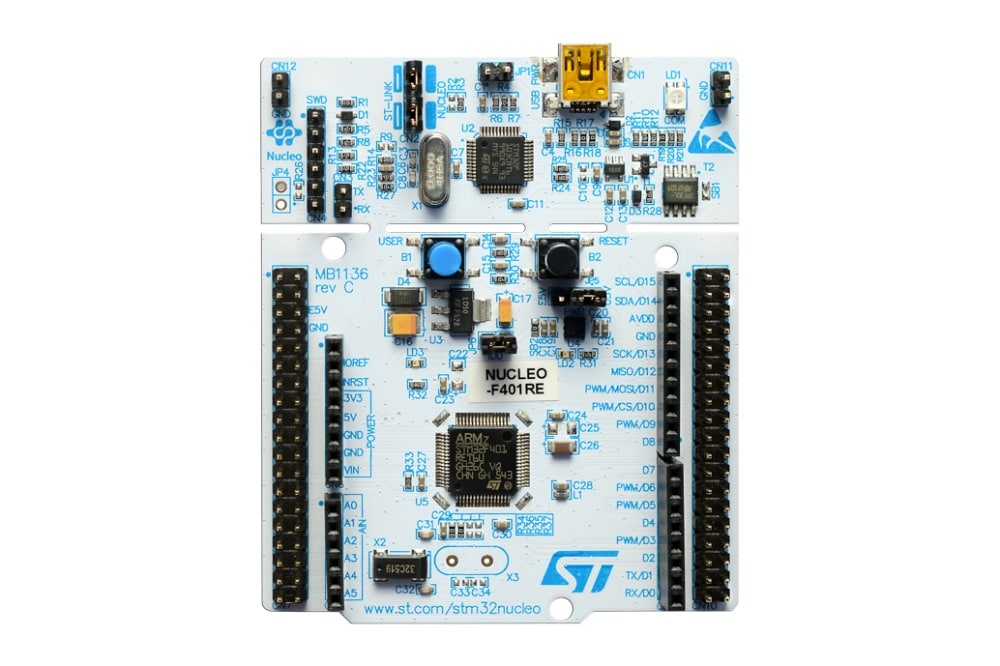Codal target for the NUCLEO_F4x1RE. Codal is the core set of drivers, mechanisms and types that make up the runtime for a board in Makecode.
The codal runtime provides an easy to use environment for programming the board in the C/C++ language, written by Lancaster University. It contains device drivers for all the hardware capabilities, and also a suite of runtime mechanisms to make programming the easier and more flexible. These range from control of the LED matrix display to peer-to-peer radio communication and secure Bluetooth Low Energy services.
In addition to supporting development in C/C++, the runtime is also designed specifically to support higher level languages provided by our partners that target physical computing and computer science education. It is currently used as a support library for Microsoft MakeCode
Codal-core must be implemented by third party developper to support new hardware target.
The the NUCLEO_F4x1RE allows users to develop applications for embedded device.
The STM32 Nucleo-64 board provides an affordable and flexible way for users to try out new concepts and build prototypes by choosing from the various combinations of performance and power consumption features, provided by the STM32 microcontroller. For the compatible boards, the external SMPS significantly reduces power consumption in Run mode.
The support for Arduino Uno V3 connectivity provides unlimited expansion capabilities with a large choice of specialized add-on boards.
- Flash memory
- Bluetooth® V5 module
- USB OTG FS
- 2 push-buttons (user and reset)
- GPIO
- ADC 12 bits
- FAT Storage over the flash memory
- Expansion connectors:
- Arduino™ Uno V3
Before using this target you need to configure your platforms with some software. Codal is also a build system to simplify as much as possible the experience of novice users.
- Install
git, ensure it is available on your platforms path. - Install the
arm-none-eabi-*command line utilities for ARM based devices, ensure they are available on your platforms path. - Install CMake(Cross platform make), this is the entirety of the build system.
- Install
Python 2.7(if you are unfamiliar with CMake), python scripts are used to simplify the build process. - Clone the repository https://github.com/lancaster-university/codal
- Create a
codal.jsonfile :{ "target": { "name": "codal-stm32-NUCLEO_F4x1RE", "url": "https://github.com/letssteam/codal-stm32-NUCLEO_F4x1RE", "branch": "master", "type": "git", "test_ignore": true } } - In the root of this repository type
python build.pythe-coption cleans before building. - The bin file
NUCLEO_F4x1RE.binwill be placed at the location specified bycodal.json, by default this is the root. - To test the sample program, you just copy the bin file in the mass storage of the board.
If you would like to override or define any additional configuration options (#define's) that are used by the supporting libraries, the codal build system allows the addition of a config field in codal.json:
{
"target": {
"name": "codal-stm32-NUCLEO_F4x1RE",
"url": "https://github.com/letssteam/codal-stm32-NUCLEO_F4x1RE",
"branch": "master",
"type": "git",
"test_ignore": true
},
"config":{
"NUMBER_ONE":1
},
"application":"source",
"output_folder":"."
}The above example will be translate "NUMBER_ONE":1 into: #define NUMBER_ONE 1 and force include it during compilation. You can also specify alternate application or output folders.
By default, the application present in the source directory is the content of the samples directory of this repository. Since you can just execute one example at the time, you need to configure your target to specify the one you want.
For example, if you want to test the BLE_TEMPERATURE_ALARM_SAMPLE, you need to configure the corresponding #define with the following codal.json:
{
"target": {
"name": "codal-stm32-NUCLEO_F4x1RE",
"url": "https://github.com/letssteam/codal-stm32-NUCLEO_F4x1RE",
"branch": "master",
"type": "git",
"test_ignore": true
},
"config":{
"BLE_TEMPERATURE_ALARM_SAMPLE":1
},
"application":"source",
"output_folder":"."
}